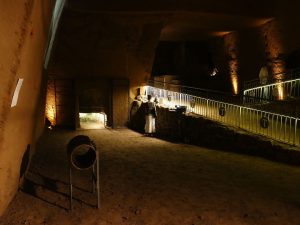In the basement of the Basilica of Pietrasanta, water, the source of life, is being recognized worldwide.
In recent days, the Lapis Museum – Water Museum in Naples has been included in the UNESCO Global Network of Water Museums.
Naples will thus be the first metropolis in southern Italy to be included in UNESCO’s scientific network, called the Global Network of Water Museums (WAMU-NET).
This network was founded by UNESCO with the aim of promoting sustainable uses of life’s most precious commodity.
The reference website-where, as of today, the Naples Water Museum is also located-is http://www.watermuseums.net .
The Lapis Museum was opened in 2021 by the Pietrasanta Polo Culturale Ets Association in collaboration with ABC.
The museum has enabled the reactivation of two huge basins carved from the tufa excavated under the Decumani in Greek times (about 2,400 years ago, when Naples was founded).

The basins can be reached by an “archaeological” elevator made possible thanks to funds from the Campania region.
The historical value of the water is daily brought to the attention of tourists by expert guides.
Lapis Museum affiliated with UNESCO World Network
According to Eriberto Eulisse, executive director of the Global Network of Water Museums, the affiliation of the Naples Water Museum “Lapis” to the UNESCO World Network of Water Museums confirms not only the centrality of the historical Neapolitan heritage of water civilization in the Mediterranean basin, but also the role that all institutions must play today to promote new educational activities toward more forward-looking uses of the resource, from domestic and daily to larger-scale uses, to found a “new coexistence” with the most precious commodity.
Photocredits: Instagram


